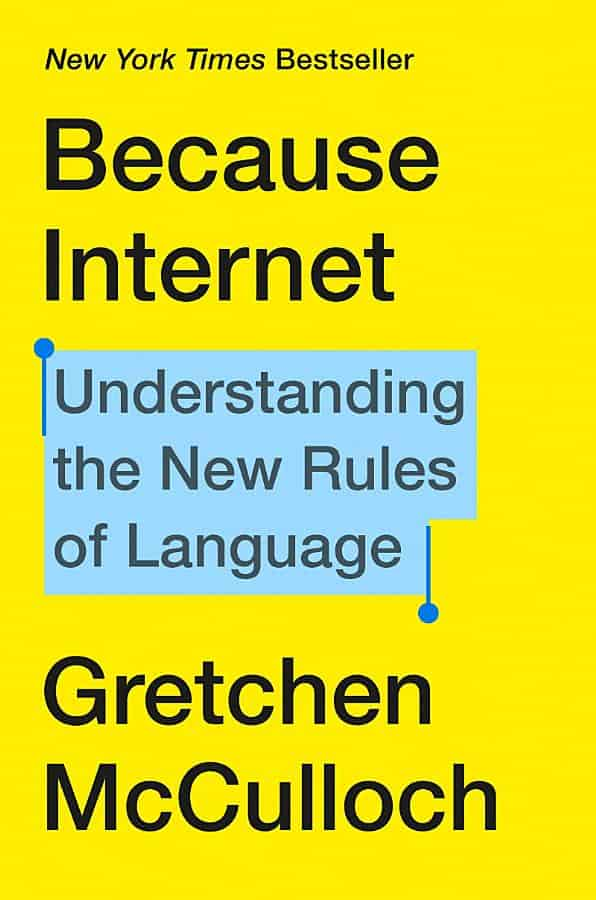Ooh, this was FUN. It’s a fascinating look at how language evolves, and how rapidly it’s evolving now because internet—and arguably for the better, because internet-speak conveys this whole spectrum of emotional nuance that formal written language cannot.
Highlights and takeaways, an incomplete list:
- It’s not just that we make patterns; humans are basically incapable of doing things without patterns
- Young women are the language disrupters
- Twitter, where you’re encouraged to follow people you don’t already know, has more linguistic innovation (not to mention memes and social movements) than Facebook, where you primarily friend people you already know offline
- The curse of Latin-y grammar
- Grammar and spelling are collective agreements, not eternal truths; collective agreements can change
- What teens are doing is sophisticated
- Linguistic play as a writing exercise
- Reshaping informal writing into something that could more deeply convey the full range of human emotions
- Incoherence is the invitation to create
- Our language about emotion is embodied; you believe their body, not their words
- Japanese (eastern) anime and emoticons emphasize the eyes; western emphasizes the mouth
- Illustrative emoji (the birthday cake; it means what it means) vs. emblematic emoji (the eggplant; it means what it doesn’t mean)
- Emoji have the same rhythmic tendency as beat gestures
- Plain words weren’t actually good enough for Shakespeare
- The telephone was the first major technological disrupter (all new ideas meet resistance: cf. the obsolete controversies of the past)
- Phatic phrases and “butler lies”
- Social media is the third place
- Privacy through obscurity
- Irony, paradoxically, creates space for sincerity
- Language is a network
- Godwin’s law was an experiment on memes
- Both memes and needlework are collective folk texts
- Writing that builds on the universe of other writing is among our oldest forms of storytelling—all fiction is fanfiction
- We’ve had the right to adapt longer than we’ve had the right to prevent copying
- There is no doing it wrong, we’re creating as we go
If you’re into linguistics (🙋🏻♀️), like clever and informative books (🙋🏻♀️), are an elder millennial (🙋🏻♀️), remember the AOL dialup (🙋🏻♀️), use social media as your third place (🙋🏻♀️), find yourself hooked on Wordle (🙋🏻♀️), or want some hope for the future (🙋🏻♀️), don’t miss this book.
Also, when anybody is outraged about “kids these days” on the internet, remember that people used to be outraged over the word “hello,” which was invented with the telephone.
ETA: With all the hubbub and handwringing around the demise of Twitter, all I think is how will Gretchen do her research!
Pull quotes ⚭
“Every generation has talked slightly differently from its parents: otherwise, we’d all still be talking like Shakespeare.”
“Like how money is just squiggles on paper or on a screen until it determines whether you can eat lunch, ::words are just meat twitches:: until they determine whether you can get a job—or whether someone will even deign to tell you where the shoe section is.”
“Internet writing is a distinct genre with its own goals, and to accomplish those goals successfully requires subtly tuned awareness of the full spectrum of the language.”
“Irony, paradoxically, creates space for sincerity.”
“Irony is a linguistic trust fall.”
“When asking about the future of technolinguistic tools, like speech to text or predictive smart replies, we need to ask not just how they can be used, but how they can be subverted; not just how designers can help users communicate their intentions, but how users can help them communicate more than the designers intended.”
“It’s not that writing has completely changed, it’s that writing has forked, into formal and informal versions.”
“I’d gladly accept the decline of standards that were arbitrary and elitist in the first place in favor of being able to better connect with my fellow humans. After all, a red pen will never love me back. Perfectly following a list of punctuation rules may grant me some kinds of power, but it won’t grant me love. Love doesn’t come from a list of rules—it emerges from the spaces between us, when we pay attention to each other and care about the effect that we have on each other. When we learn to write in ways that communicate our tone of voice, not just our mastery of rules, we learn to see writing not as a way of asserting our intellectual superiority, but as a way of listening to each other better. We learn to write not for power, but for love.”
“Embodiment and projecting a virtual body may sound dangerously space-age—holograms!—but in many ways, embodiment is very old. Older than writing, as old as stories, perhaps as old as language itself.”
“Thinking of emoji as gestures helps put things into perspective: if we’re tempted to start thinking, “If words were good enough for Shakespeare, why aren’t they good enough for us?” we can pause and realize that plain words weren’t actually good enough for Shakespeare.”
“Sure enough, researchers have found that people who read a lot of fiction are better at understanding mental states than those who read primarily nonfiction or don’t read at all. In the twenty-first century, we’re going a step further: emoji and the rest make us not just readers of mental states, but writers of them.”
“The chat format’s astonishing durability signals the true birth of a new form of communication. Chat is the perfect intersection of written and informal language.”
“If you’re wondering why this book hasn’t talked about something you’re interested in, consider this an invitation to draw your own map of another portion of the territory, to conduct your own internet linguistic research.”
